
1 min readSelf-Unawareness All Around
by Guy Gage | July 18, 2021 | Business, Leadership, Performance, Personal Management

Wrong Message
Have you ever been with someone who says or does something consistently and you notice that they are being misinterpreted? It may appear to be inappropriate or awkward and you just can’t understand why they continually do it. And worse, they seem to have no idea of the wrong message they send. If you’ve experienced this, you may have encountered someone demonstrating self-unawareness.
As a professional, you try to be clear with your intentions and avoid being misinterpreted. You want to be seen as courteous, respectful, show interest and be willing to help. It’s a part of your professional signature. While that is your intent, you can still be unaware that some of your behaviors and practices send a wrong message. Interestingly, while most people consider themselves to be self-aware, the evidence demonstrates that only about 10-15% actually are.
Examples
For instance, your quietness may be misunderstood as disinterest. Your compassion for others may be misinterpreted as weakness. Your engaging extroversion may be seen as chatty and lacking substance. Your drive to achieve may be viewed as only thinking of yourself. These perceptions are not true, yet others can draw wrong conclusions about you. It’s really not fair.
When it happens to others, it really makes you wonder why they do what they do. The more obvious it is to you, the more you ask yourself, “how could they NOT know?” Well, if they are self-unaware about a particular practice or behavior, they actually DON’T know. Their lack of awareness of their impact is beyond their ability to discern it. And because it isn’t their intention, they are fully blind to it.
How To Help
So what do you do when someone with whom you have a good relationship behaves in a way that, unbeknownst to them, sends a wrong message to others? Do you say something? Or do you hold back and let it go, leaving that person to continue floundering in their own self-unawareness? Most people choose the latter, thinking they don’t want to hurt someone’s feelings, or potentially cause a confrontation, or avoid shaking someone’s confidence.
But what do you say when they find out that you knew a certain behavior or practice of theirs was being misinterpreted and you didn’t tell them? All of those excuses hardly justify to them your unwillingness to help.
Going forward, be diligent to increase your own self-awareness and along the way, help another to increase theirs. Because self-unawareness is all around.
Read Related Blogs:
Overcoming Resistance: The Pain Point That Sparks Firm Change
Change is tough, especially in accounting firms where partners often resist new strategies. As outlined Guy Gage’s recent article, Breaking Through Partner Resistance, transformation occurs when the pain of sticking to the status quo outweighs the fear of change. This...
Igniting the Spark
In February, a senior manager attended our Leading Your Team course. The program explores how managers can better understand and lead their team members by recognizing different working and relational styles. For him, this experience marked a turning point. He walked...
Leading with Certainty: Anchoring Leadership in Vision and Values
Effective leadership is grounded in the certainty of what is known: the long-term vision, enduring values, and guiding principles that define an organization’s identity. In a recent coaching conversation with a senior leader navigating a period of rapid change, this...



